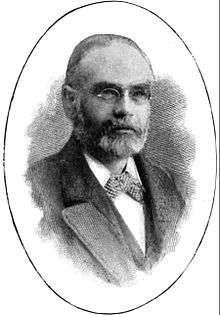David Jenkins (composer)
David Jenkins (30 December 1848 – 10 December 1915) was a Welsh composer, best known for his choral works and hymn tunes.[1]

Born at Trecastle near Brecon, Jenkins was apprenticed to a tailor at a young age, due to the death of his father.[1] He did not take an interest in music until he was nine years old. At the time, Jenkins was a member of a choir which was to compete in a local Eisteddfod.[2]
At age sixteen, his musical interest deepened and Jenkins began serious study of the Tonic-Solfa system. Two years later, he received an advanced certificate from the Tonic-Solfa college and began conducting his own choir.[2] At age 20, Jenkins and his choir won a competition at Llanddeusant. He next turned his attention to the study of composition, harmony and counterpoint and was awarded a prize for the best anthem from the Tonic-Solfa college.[2]
In 1874 he began studying music at Aberystwyth. By his second term, he had been awarded a three-year scholarship and became an assistant to Joseph Parry.[1][2] Jenkins continued participating in various Eisteddfodau at home and abroad. He had won a prize at the Utica, New York Eistoddfod in 1873 and won a national prize at Pwllheli in 1875.[2] Jenkins also continued composing and studying music. He was awarded the top prize in composing for his cantata Arch y Cyfamod at Carnarvon in 1876; the next year, Jenkins received a Bachelor of Music degree from Cambridge University.[2]
Jenkins spent four months touring the United States in 1885; during that time he served as a conductor and as a judge at the various singing festivals.[2] In 1893 he returned to Aberystwyth as a lecturer.[1] Jenkins continued composing while at the university; composing an oratorio, Dewi Sant (Saint David), for the 1894 Eisteddfod at Carnarvon, and a cantata, The Psalm of Life for the 1895 Cardiff Triennial Festival.[2] This work was performed by 2,000 voices at the Crystal Palace, London in the same year.[1]
He continued his activities conducting choirs and serving as a judge at various Eisteddfodau; Jenkins also became a co-editor of the music journal Y Cerddor, sharing the duties with Emlyn Evans.[2] He rose to Professor at Aberystwyth in 1910; retaining this position until his death in 1915.[1]
Works
References
- Lloyd, John Morgan. "David Jenkins". Welsh Biography Online.
- Griffith, Frederic (1896). Notable Welsh Musicians (of Today): With Portraits, Biographies, and a Preface on the Condition of Music in Wales at the Present Time. F. Godwin. p. 6. Retrieved 2 April 2016.